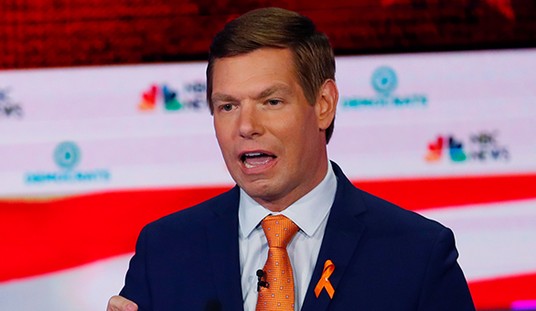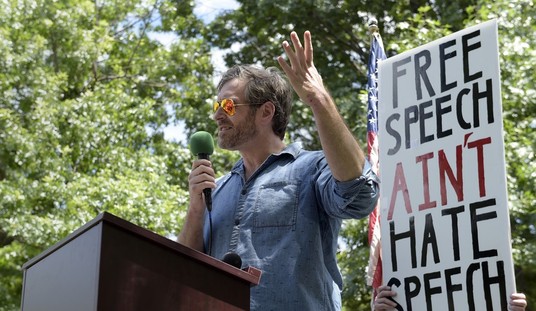Get yourself ready for it. The media is going to praise Danny Glover for getting arrested for standing up for workers abused by capitalism run amok. On April 16, he was arrested at a protest against the Sodexo food service company for their treatment of workers. He’ll be hailed as a hero and other Hollywood stars will follow in his footsteps, if for no other reason than publicity, but Glover deserves no praise. He has a history of painting America as the problem and anti-American regimes as the saviors of the oppressed.
“We’re here today to say no more to deplorable pay and working conditions,” Glover shouted before he was arrested after crossing a police line. He wasn’t apprehended for the protest, but for deliberately provoking law enforcement. He was asked three times to move back over the yellow tape and refused.
His admiration for Venezuelan leader Hugo Chavez, who is surely treating his critics far worse than Sodexo is, gives us an idea of the lens through which Glover views the world. Chavez’s government donated $30 million to a film being made by Glover about Toussaint Louverture. The funding sparked protest from figures in the entertainment industry in Venezuela, who were then punished by having their film guilds shut down.
Glover sits on the advisory board of Telesur, the state-owned television network owned by Chavez’s government, and has frequently appeared on Chavez’s own show. This friendship is forged by anti-Americanism and support for the neo-Communist ideology of Chavez. Glover’s friend and fellow actor, Harry Belafonte, said during a trip to Venezuela he took with Glover that “no matter what the greatest tyrant in the world, the greatest terrorist in the world, George W. Bush says, we’re here to tell you: Not hundreds, not thousands, but millions of the American people … support your revolution.” It doesn’t get much more Red than that.
Glover’s other hero is Fidel Castro. He signed a letter calling on the United Nations to defend Cuba against the U.S.’s accusations of human rights abuses, asking that it not “legitimize the anti-Cuban aggression of the administration of Bush.” The Cuban state media has written: “There’s an intense relationship between Danny Glover and Havana. It was love at first sight, and not only has it stood the test of his frequent visits, but it is growing deeper and deeper, through discoveries and affinities.”
Even more revolting was Glover’s reaction to the 9/11 attacks. His immediate reaction was to describe the U.S. as “one of the main purveyors of violence in the world,” drawing moral equivalence between the terrorist attacks and what he feels is American imperialism.
On the eve of the first anniversary of the attacks, he spoke at the University of Arkansas and stated that poverty had caused terrorism and that the U.S. should not respond with force but with dialogue. He called on the country to use the tragedy to focus on our “over-consumption” and how “we’re taking a terrible toll on this planet.” At another event, he expressed his disappointment at the reaction of the American people to the attacks, specifically the “rabid nationalism that has its own kind of potential of being maniacal, in some sense.”
In December 2002, Glover traveled with Belafonte to Havana for a film festival. Apparently the two were too busy reciting anti-American propaganda to see any movie released in recent years, because they claimed that corporations that represent the “interests of the Pentagon and the White House” were motivating Hollywood to make movies that glorified war. Belafonte said that the 9/11 attacks gave Bush an excuse to dominate the world.
Glover has also called President Bush a “racist,” saying that as governor of Texas, most of the people executed by him were minorities. At an anti-Iraq war protest in February 2003, he described the Bush administration as being “liars and murderers.”
Glover has also chosen to associate with the fringes of the American political scene. He has admitted that when he was in the Black Students Union he worked alongside the Black Panthers. In 2006, he went on a hunger strike with other celebrities to oppose the Iraq war in a protest organized by Cindy Sheehan and Code Pink. He’s worked with Not In Our Name, an anti-war group that opposes American foreign policy and was founded by a member of the Revolutionary Communist Party.
Israel is another one of Glover’s targets. In September 2009, he and other celebrities boycotted the Toronto International Film Festival over the event’s focus on a group of Israeli filmmakers. Glover signed a statement calling Israel an “apartheid regime” and describing the Israeli films as “propaganda.” Simcha Jacobovici, a Jewish documentary-maker and host of the The Naked Archaeologist, rebutted by saying that John Greyson, the author of the anti-Israel letter, would be treated better in Israel than in the Palestinian territories.
“[If he] were to walk down the streets of Tel Aviv with a sign saying he is a homosexual filmmaker, he would be invited to the Tel Aviv Queer Film Festival. But if he did that in Ramallah or any other Palestinian village in the Territories, his films would have to be shown posthumously because they would kill him,” Jacobovici said.
Glover and his Hollywood pals see a moral equivalence at best, and often a moral gap, between the U.S. and its enemies, with our opponents being the true freedom fighters. For Glover, America’s society, military-industrial complex, and selfish nature are to blame for the world’s ills. If you hate America’s society, foundations, economic system, government, policies, and military, and embrace its enemies, then you hate America. The media should not praise Glover as an enlightened example of a crusader for justice, for his form of justice is no justice at all, but the very sort of thing this country was created to oppose.









Join the conversation as a VIP Member